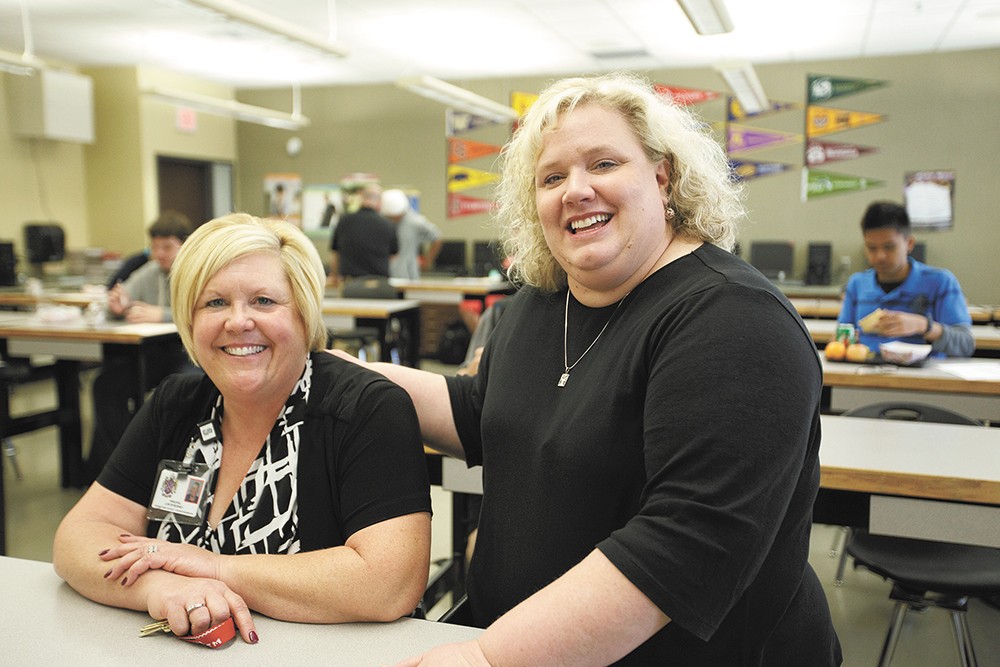
KIDS THESE DAYS
A 9-year-old boy at Harmon Field runs to catch up with the rest of the crowd as they head back to Northeast Youth Center. There's no school today; it's spring break. So today, the center takes all the kids, roughly 30 of them, to the park.
The boy usually gets help with his homework at the youth center. From Regal Elementary, he goes there nearly every day after school. One time, the boy says, he got in trouble for kicking another kid. He says he gets in trouble all the time for doing "bad stuff" at the youth center, but that's no different than school, or home.
Empire Health Foundation's Sarah Lyman says that Hillyard has high rates of "adverse childhood experiences," the single greatest predictor of academic failure. She has been leading an effort to train Rogers High School teachers in how to talk to kids, many of whom are living in constant states of trauma or fear at home and act out in class as a result.
"There's been a lot of investment in trying to shift the school culture to something that's going to be more supportive for kids to succeed," she said.
By helping teachers build relationships with students, she says, suspensions can be cut down and more students can stay in school and complete courses.
"Of course, the issues that Hillyard is facing are so complex," Lyman says. "No one system will fix it all."
Some older kids are across the field at Hillyard Skatepark, where Cameron Wilder straddles his bike seat. His friends show off skateboard tricks, while girls circle on rollerblades.
Wilder, a junior at Rogers High School who lives in Hillyard, sees kids get pulled out of class all the time for acting out. Wilder thinks it's sometimes the teacher's fault — they don't understand why the kids are behaving this way because they don't live in Hillyard. "They live in, like, Five Mile," Wilder says.
When kids get sent out of class, Wilder becomes a sort of translator between student and teacher.
"Usually I'll go out in the hallway and talk to some of my friends and ask them what's going on," Wilder says. "They'll tell me. I'll tell the teacher, and they'll understand."

STRAIGHT OUT OF HILLYARD
A decade ago, Rogers' principal tried to stop kids from chanting "Hillyard" at sporting events.
Whether Rogers was winning or losing, she thought the chant came from a negative place: Hillyard was poor, so students from Hillyard were expected to lose.
That didn't go over well. Hundreds of students gathered in protest of what they saw as a ban of the word, and they sent a clear message: We are Hillyard. And we are proud.
Yet after four years of school, many of those same students would end up without a high school degree. In 2008, two years after that protest, the graduation rate at Rogers was under 50 percent.
That rate has since gone up. By 2012, the graduation rate was more than 80 percent, where it has hovered ever since. It has plateaued because more than a third of the students who feed into Rogers — an area that includes Hillyard but also other parts of northeast Spokane — live at or around the poverty line, says Lori Wyborney, who took over as Rogers principal in 2010. Other students have experienced different kinds of trauma at home, which can make school less of a priority for them.
"When there's no food on the table and you don't know where you're going to be living," Wyborney says, "school really becomes a secondary thing. We really need to eliminate those things so school can go to the forefront."
Still, she says the kids from Hillyard should be proud of their resilience.
"My students come to school in spite of so many obstacles," she says. "Obstacles that kids from a lot of parts of Spokane wouldn't have any idea about."
IN THE ZONE
Andre Wicks pulls over his car at Shaw Middle School, where he was assistant principal a couple of years ago.
"Right here, within 3 to 4 city blocks of each other, you have a nucleus of assets and resources for people to access," Wicks says.
Around the corner is NEWTECH Skills Center, which provides technical training to high school students, and On Track Academy, which provides a more personalized educational option for kids. Regal Elementary is across the street, and a block in the other direction is Northeast Community Center.
Wicks left Shaw in the hopes of impacting kids in a different way — a decades-long effort to increase educational outcomes through all facets of the community. That means all of these community resources, along with dozens more in northeast Spokane, need to be united under a common banner. If getting more kids to graduate came down to hiring better teachers or training them, it would already be happening, he says.
"The reality is, students who are coming from trauma, students who are coming from homes — maybe they're homeless, maybe they don't have both parents, maybe neither or only one of their parents is working," Wicks says. "All of those things get in the way of students being successful in school."
The Zone Project, a collaboration between Spokane Public Schools and the city of Spokane, aims to create better housing, educational and employment opportunities in northeast Spokane. Wicks, as the project's director, has partnered with the dozens of community organizations leading various initiatives that contribute to this overall goal. Wicks has also applied for northeast Spokane to become a Promise Zone through the federal Housing and Urban Development program, which would make the area eligible for more resources and potential grants. He's expecting to hear if the project qualifies for that designation in June.
Wicks says he's made a commitment to devote the better part of a generation to this project. That's because the issues facing northeast Spokane are multigenerational. It's something he's been exposed to the more he talks with kids in the Hillyard area.
"It's kind of like this push and pull of hopeful and hopeless," Wicks says. "The poverty that exists in the northeast area, it's multigenerational. So you have two to three generations of people that have really struggled, and the third-generation kid that's living in poverty doesn't know anything different."
Improving the Hillyard neighborhood, he says, is not about changing it. It's about highlighting its strengths and working with its people, not against them.
"There's a lot of pride in being gritty," Wicks says. "There's a lot of pride in being resilient, and I see that a lot. That, in terms of assets, is a really, really great asset about the community, is its grittiness." ♦



















